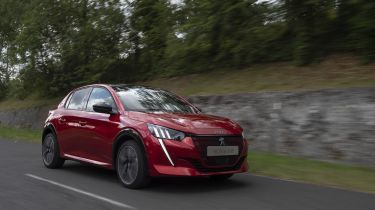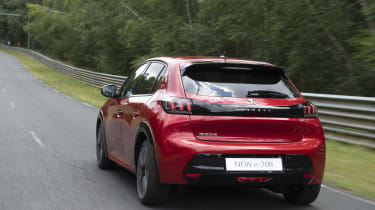Electric Peugeot e-208 prototype review
Will a 211-mile range be enough to make the new Peugeot e-208 a sales success?
Alongside the petrol and diesel versions of the new Peugeot 208, Peugeot revealed that its Ford Fiesta rival will be available with an electric powertrain for the first time. The headline figures look impressive: a promised range of 211 miles, no exhaust emissions and 100kW fast-charging capable of replenishing the battery to 80% in just 20 minutes. We’ve driven a prototype before the Peugeot e-208 hits showrooms to see what you can expect from Peugeot’s first electric car.
Much of the car is similar to the petrol Peugeot 208 - it shares its ‘CMP’ platform (which also underpins the forthcoming Vauxhall Corsa-e), smart interior and sharp styling. In fact, only a blue tinge around the Peugeot Lion mascot and e-208 badges are different from petrol and diesel models. Peugeot has chosen to do this to normalise the electric variant.
The e-208 is powered by a 134bhp electric motor and a 50kWh battery, which propel it from 0-62mph in a smidge over eight seconds. Electric cars are capable of delivering all their power immediately and there aren’t any gears to disrupt progress, so the driving experience is effortless. It hasn’t been designed as a mini-sports car though; it doesn’t feel particularly quick from a standstill and the extra weight of the batteries affects the ride comfort slightly. There’s a bit of extra body roll compared with the petrol 208 in corners and it’s slightly less composed on broken, potholed tarmac.
Electric cars also feature ‘regenerative braking’, which recoups the energy that would be lost when you slow down to charge the battery. Unless you need to brake hard, you can simply lift your foot off the accelerator and the car will glide to a halt. It’s like second-nature once you’re used to it and the e-208 lets you choose between two settings for the brake regeneration. We noticed that pressing further than halfway on the brake pedal makes slowing down a clunky experience, as the transition between the regenerative braking and the brake discs cutting in isn’t very smooth.
The interior is almost identical to the petrol 208 model we’ve tested. Both cars share the same minimalist design, premium materials and technology, and the e-208’s practicality hasn’t been harmed by the batteries. The boot is the same size at 311 litres but it’s slightly disappointing that there’s nowhere to store the charging cable when you’re not using it. Many electric cars offer underfloor storage where you can stow the charging cable.
Charging to full capacity takes around 7.5 hours with a 7kW wallbox charger, or about 40 minutes on the 50kW chargers at many motorway service stations. When you charge at home, it’s likely to cost around £7 on a standard tariff.
The savings in running costs should be substantial, then, but the car is quite expensive to buy initially. For an entry-level Active model, you’ll need to hand over almost £25,000 (after the Government has paid the £3,500 plug-in car grant) and, even though it’ll offer air conditioning, cruise control and sat nav, that’s a lot more than the price of the petrol version. The difference could be as much as £7,000, so you’ve really got to want an electric car to stomach the extra. The Vauxhall Corsa-e, with the same platform and powertrain, will cost £270 per month after a £5,000 deposit on a PCP finance deal, and the Peugeot e-208 should be available for similar monthly payments.
The new Peugeot e-208 will hold particular appeal for company-car drivers, however, as EVs will be tax-free for businesses from 2020.
Read our prototype review of the petrol Peugeot 208 here.
Recommended

New Subaru Trailseeker revealed as rugged electric SUV with 375bhp

New Subaru Solterra brings more range, power and polish
Most Popular

Omoda E5 targets rivals: now with zero deposit and APR
Tips & advice

Car dashboard warning lights: what does each symbol mean?

Electric car charging stations: public networks, charger types, apps and maps











